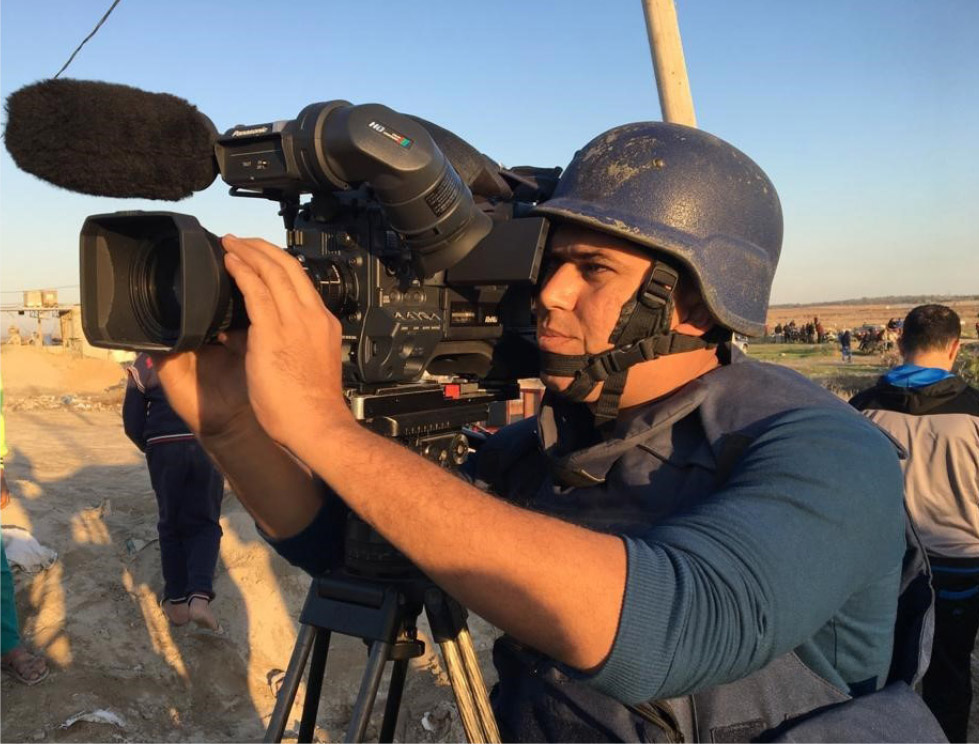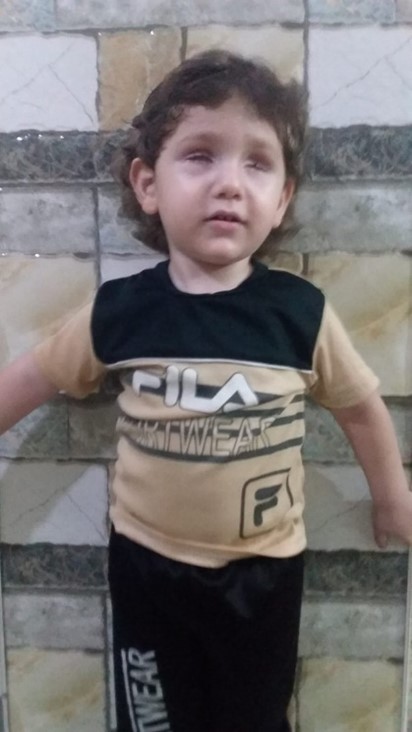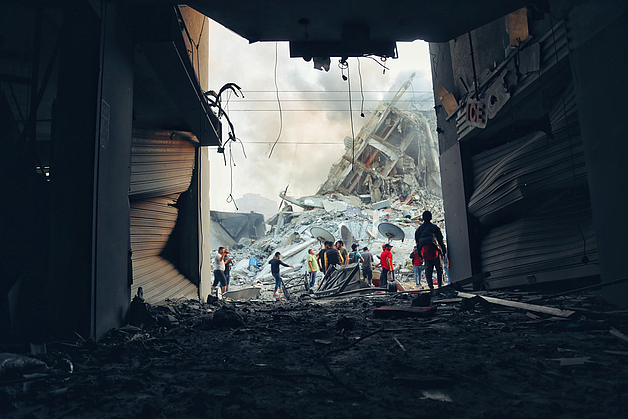“I’m a photographer, so my work depends on my sight.”

Tamer is a 39-year-old photojournalist from Rafah in the south of the Gaza Strip, working for the Associated Press (AP).
His sight has been deteriorating since he was diagnosed with a congenital eye condition in 2017. Tamer has required extensive treatments and investigations, not all available in the Gaza Strip.
Before May this year, Tamer had received permits from Israel to reach health care in Jordan and at Hadassah Ein Karim Hospital in Jerusalem. While in Jordan, he saw his mother for the first time in nearly 20 years. She is Palestinian and lives in Al-Lydd but has been unable to visit her family in Gaza because of having Israeli citizenship.
“At Hadassah, they told me I would need surgery for my right eye as well, but it would only be possible after my left eye improved… I had smooth access to Hadassah up until May... After that, I lost four appointments. My last application for 1 August was not approved in time for my appointment.”
Table 1: History of Tamer’s applications for an Israeli medical permit and outcomes
|
Date of application |
Hospital |
Response |
|
21/02/2019 |
Hadassah Ein Karim |
Denied |
|
09/09/2019 |
Hadassah Ein Karim |
Denied |
|
07/10/2019 |
Jordan by Shuttle |
Approved |
|
31/08/2020 |
Hadassah Ein Karim |
Approved |
|
01/11/2020 |
Hadassah Ein Karim |
Approved |
|
04/01/2021 |
Hadassah Ein Karim |
Approved |
|
08/02/2021 |
Hadassah Ein Karim |
Approved |
|
14/02/2021 |
Hadassah Ein Karim |
Approved |
|
01/03/2021 |
Hadassah Ein Karim |
Approved |
|
22/03/2021 |
Hadassah Ein Karim |
Approved |
|
18/04/2021 |
Hadassah Ein Karim |
Approved |
|
26/04/2021 |
Hadassah Ein Karim |
Approved |
|
24/05/2021 |
Hadassah Ein Karim |
Delayed |
|
13/06/2021 |
Hadassah Ein Karim |
Delayed |
|
27/06/2021 |
Hadassah Ein Karim |
Delayed |
|
01/08/2021 |
Hadassah Ein Karim |
Delayed |
Tamer talked about how his illness and the uncertainty of accessing treatment has affected his health and his family life during these past years.
“I want to go back to what I had before, even half the vision I had before. I’ve gained weight and it hurts to stay at home and not be able to move like I used to. I’ll apply as many as needed to get a permit to reach treatment... The AP [Associated Press] is trying and won’t stop until we get good news. I need the treatment; I can’t stay at home like this. I’ve had to bear this for three years.
My children are young, and my wife has supported me through all this. The kids see their father stay home rather than the active father they knew before – who was working, who took them out, who took them down to the beach. I’m not able to do any of those things with them now.”
As a photojournalist, Tamer worries about his work and his future.
“I’m so afraid of losing my sight. If I lose that, I won’t be able to work, and my work is like the air I breathe. The wait is unbearable.”
My three-year-old son, Ameer, had cancer in his eyes. Now he needs treatment.
 9 July 2021 - Three-year-old Ameer is a refugee living in Khan Younis in the south of the Gaza Strip. In August 2019, he was diagnosed with a cancer in his right eye called a retinoblastoma. He had surgery outside the Gaza Strip at the time to remove the cancer, and received an ocular prosthesis – a custom-made ball that fits the socket to keep the shape of the eye. In January 2020, the cancer was found to have spread to Ameer’s left eye, and he had further surgery.
9 July 2021 - Three-year-old Ameer is a refugee living in Khan Younis in the south of the Gaza Strip. In August 2019, he was diagnosed with a cancer in his right eye called a retinoblastoma. He had surgery outside the Gaza Strip at the time to remove the cancer, and received an ocular prosthesis – a custom-made ball that fits the socket to keep the shape of the eye. In January 2020, the cancer was found to have spread to Ameer’s left eye, and he had further surgery.
From March 2020, the prosthesis Ameer had for his left eye came out. After failed attempts to put the prosthesis back, doctors in the Gaza Strip provided a temporary solution with silicon – though this caused irritation and inflammation. In 2021, Ameer was referred to a clinic for eye prostheses at St John’s Eye Hospital in East Jerusalem.
Since February, Ameer’s family has made five applications to Israeli authorities for permits to exit the Gaza Strip. Four of those permit applications were not approved in time for the appointments, while on one occasion the hospital had to cancel. Ameer’s last appointment was scheduled for 16 May, during the escalation of violence and aerial bombardment of the Gaza Strip.
“My children were really scared during the attacks,” said Ameer’s mother. “I was scared too, but I couldn’t cry in front of them. In those times I told myself it was good we didn’t get a permit to leave. Imagine if I had been in the hospital in Jerusalem with my kids here under the airstrikes. It was a blessing that we were all together during those difficult days.”
Ameer’s family desperately wants him to receive care within the occupied Palestinian territory. During his initial treatment, Ameer had been referred to Egypt but difficult travel, long hospital stays and costs of copayments for care left his family facing heavy debts. Ameer’s mother explained:
“We stayed two months in Egypt the first time and 40 days the second time. We had to pay the costs of medical imaging, blood analysis and other treatments. We also needed to rent an apartment during the time there. In total we paid US$3,500. We took out loans to pay but now we are swamped with large debts. My husband works at a small restaurant, the salary is around US$10-15 per day to feed our whole family. In Egypt I was taking care of Ameer, but I worried about my four other children back in Gaza. My other kids love Ameer, and they take care of him and protect him.”
Ameer’s next appointment for a prosthesis fitting is on 11 July. The family is waiting for a response from Israeli authorities.
Staggering health needs emerge in the occupied Palestinian territory in the wake of recent escalations
 Destruction in Gaza following Israeli strike May 2021 © Photo by Mohammad Libed / OCHACairo, 1 June 2021 – As the ceasefire in the occupied Palestinian territory (oPt) holds, WHO is scaling up its response to provide health aid for almost 200 000 people in need. WHO has so far provided essential medicines to support trauma care and ambulance services for more than 2000 injured beneficiaries in the Gaza Strip, and 10 triage and treatment tents by WHO have been set up outside 6 Ministry of Health emergency departments, also in the Gaza Strip.
Destruction in Gaza following Israeli strike May 2021 © Photo by Mohammad Libed / OCHACairo, 1 June 2021 – As the ceasefire in the occupied Palestinian territory (oPt) holds, WHO is scaling up its response to provide health aid for almost 200 000 people in need. WHO has so far provided essential medicines to support trauma care and ambulance services for more than 2000 injured beneficiaries in the Gaza Strip, and 10 triage and treatment tents by WHO have been set up outside 6 Ministry of Health emergency departments, also in the Gaza Strip.
“The situation is volatile. WHO remains concerned about the situation in oPt and calls for unhindered access for humanitarian and development-related essential supplies and staff into Gaza and the referral of patients out of Gaza whenever needed,” said Dr Rik Peeperkorn, WHO Representative in oPt.
With COVID-19 still a persistent threat, WHO and UNICEF, through the COVAX Facility, have supported the delivery of more than 260 000 doses of COVID-19 vaccines to oPt, including 60 000 doses delivered today. As of 31 May 2021, 337 191 confirmed cases of COVID-19 and 3765 deaths have been reported, with positive cases increasing in Gaza in recent weeks. WHO has also provided essential medicines and consumables to East Jerusalem.
Earlier armed conflict in oPt sparked further population displacement and exacerbated a prolonged humanitarian crisis. Hostilities resulted in a loss of 278 Palestinian lives and over 9000 injuries. Over 77 000 people were internally displaced and around 30 health facilities have been damaged. Around 600 referral patients were affected due to closure of the crossings during the escalation of hostilities.
On 20 May, WHO launched an appeal for US$ 7 million to support its health operations for the next 6 months, focusing on trauma and emergency care, mental health and psychosocial services, advocacy, and maintaining essential health services, including for COVID-19. To date, US$ 2.3 million has been received from the US$ 7 million appeal.
“Palestinians’ lives are deteriorating; many of the people affected by the conflict are in urgent need of aid and face other health threats like COVID-19. WHO is working to support the Palestinian health system and its partners in its emergency humanitarian response and calls for the support of the international community in these efforts,” said Dr Rik Peeperkorn.
Updates on escalation in occupied Palestine territory 2021
About our reports:
These flash updates will report on the latest impact on health and people’s lives as a result of the escalations of violence across oPt, both from the continuing aerial bombardment of the Gaza Strip and settler-related unrest in the West Bank including East Jerusalem.
Escalation flash updates:








